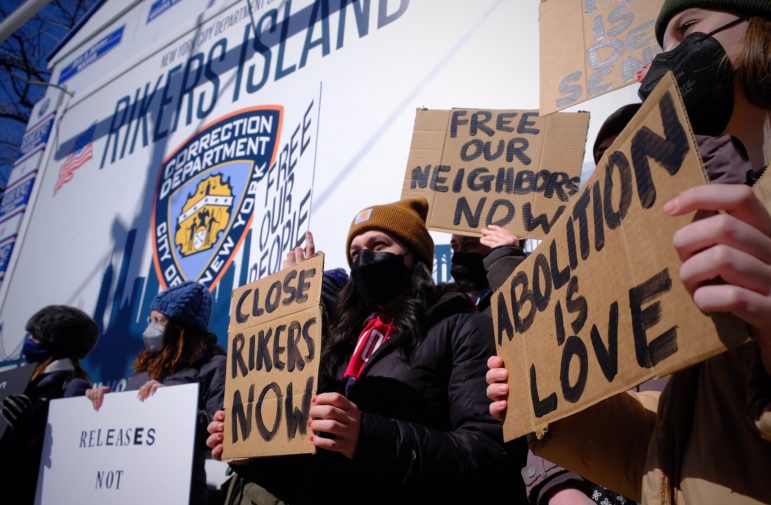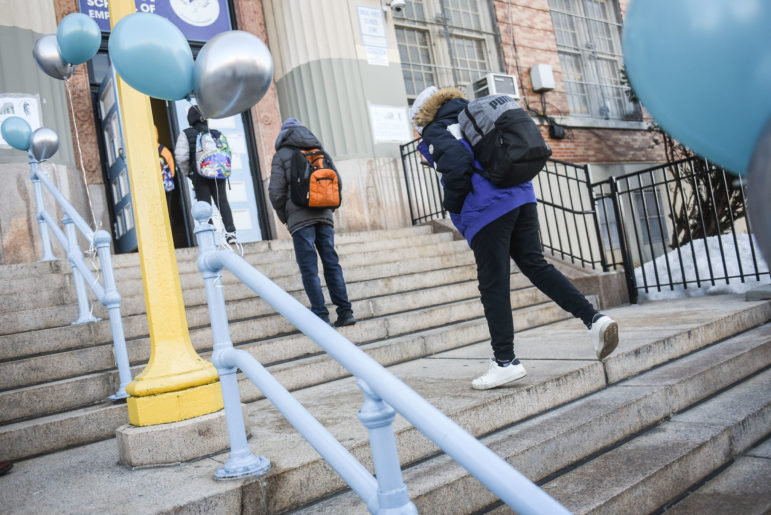“Do New York City’s leaders intend to build a new jail every time an old one fails, as it always will? In a city which boasts some of the world’s leading creative, political, and courageous minds, can we not recognize policing and imprisonment as policy failures?”

Gerardo Romo/NYC Council
Protestors hold signs calling for the closure of Rikers Island jails at a rally in 2019.As officials across the country move to criminalize people for accessing abortion, reproductive and gender-affirming care, Gov. Kathy Hochul and Mayor Eric Adams have attempted to position themselves as strong gender and reproductive justice advocates, promising commitments to bodily autonomy and deeming NYC a “safe harbor.”
While such statements seem encouraging, the actual policy decisions Hochul and Adams have made fly in the face of the feminist and progressive rhetoric they have adopted. In reality, their polices have supported the expansion of surveillance, policing and criminalization, creating unlivable conditions for gender-oppressed people while shrinking the life-affirming services New Yorkers need.
Gov. Hochul has publicly championed a gender justice agenda as New York’s first woman governor, but has left some of the most marginalized behind in her vision. Last fall, Hochul’s administration failed for months to address lack of clean water access for women and gender-expansive people held at the New York Bedford Hills prison. Despite the slow response to meet this basic human need, Gov. Hochul then transferred even more people to that same prison from Rikers Island, ignoring strong protests from impacted incarcerated people.
Furthermore, despite closed-door commitments to use her executive power to facilitate more clemencies for incarcerated New Yorkers to return home and reunite with their families, Gov. Hochul only issued 10 clemencies last year and has refused to issue any clemencies at all this year.
Mayor Adams has in practice, declared a war on street vendors and unhoused New Yorkers while voicing unwavering support for the NYPD. His time in office has ushered in the expansion of quality of life policing and a continued public health crisis on Rikers island. Hand in hand with this violent policing has been Adam’s austerity budget cutting the services communities rely on daily—including public education—and refusing to sufficiently invest in affordable housing.
City officials, within the ecosystem of a national political crisis criminalizing women, trans and gender non-conforming people at a national level, are, despite their rehtoric, enshrining misogyny into the political infrastructure of the city.
Hochul and Adams’ relentless commitment to expanding the police state belies their administrations’ carceral feminist priorities, which despite promising feminism, instead fails women by criminalizing survival and self-defense. The contradiction within the Adams and Hochul administrations articulates itself in a new proposal to build a jail specifically for women inside the shuttered Lincoln Facility in Harlem.
Put forward by the Columbia Justice Lab, the Women’s Community Justice Association (WCJA), —Austin, and HR&A Advisors, this plan has allegedly already received support from Hochul, and is built atop the unpopular $8 billion borough based jails plan which continues to progress on Adams’ watch.
Released a mere week after protesters flooded the streets against the leaked-SCOTUS decision ending federal protections for legal abortion, the proposal has been embraced by a few public figures including most notably, Gloria Steinem. It has led to a questionable New York Times op-ed suggesting the possibility of a “feminist” jail, with advocates claiming a jail designed specifically for “women and gender expansive people” would be a trauma-informed one.
The jail proposal emerges amidst national, state and local efforts to criminalize reproductive and bodily autonomy, and seeks to move New York City “beyond Rosie’s,” referring to the Rose M. Singer Center, a jail facility on Rikers Island. Yet, the history of Rosie’s proves the improbability of a “humane” or “feminist” jail. Rosie’s, upon its opening in 1988 was lauded for being built to serve the unique needs of incarcerated women, with a nursery, job training, gardening, sewing and cooking programs. Yet the jail has been a site of patriarchal violence, torture, medical neglect and death for decades. Rosie’s was the “gender responsive” and “trauma informed” jail of its time but those inside the jail continued to experience sexual violence, physical torment, and many, including a 31-year-old-woman on May 18th of this year, have died there.
We know who will be held in the cages of the city’s borough based jails, including the proposed Women’s Justice Center in Harlem: unhoused New Yorkers, street vendors, abortion rights activists, Black and trans sex workers. New jails gift cages to the NYPD, district attorneys, corrections officer unions and the rest of the city’s carceral infrastructure, so they may criminalize and cage us and our neighbors.
Do New York City’s leaders intend to build a new jail every time an old one fails, as it always will? In a city which boasts some of the world’s leading creative, political, and courageous minds, can we not recognize policing and imprisonment as policy failures? Do the joint criminalization of poor parents, sex workers, and people who use drugs form the basis for a new jail?
Feminist and queer organizers and historians remind us that gendered punishment is part of the political fabric of the United States. From sexual violence used to “discipline” people on plantations and reservations, to the lynchings of Black people criminalized for deviating from white supremacy’s gender and sexual politic edicts, to the historic and ongoing sterilization of people trapped in detention centers and prisons, to the rigid gender-binary that prisons and jails are organized around—punishment has historically been gendered and racialized in the United States. This proposal’s latest gender “innovation” is more of the murderous status quo.
For decades, we have been sold the false narrative that to close a jail, we have to open a new one. If the Hochul and Adams administrations truly want to lead and create a safe haven for people seeking reproductive healthcare and gender justice, they must stop investing our city resources into the very cages and criminalization that will be used against our communities, which includes the monstrous “feminist” jail and the other borough-based jails currently under construction.
We must urgently and permanently shutter the Rose M. Singer center and the other Rikers Island facilities. Allowing our neighbors to reunite with their children, families and other loved ones is itself a powerful reproductive justice intervention.
Samah Mcgona Sisay is a Bertha Justice Fellow at the Center for Constitutional Rights, where she specializes in international human rights and challenging inhumane immigration policies and abusive police practices.








